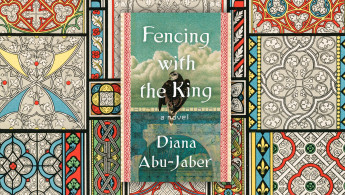Fencing with the King: A fictionalised tale about King Hussein and a bold portrayal of Jordan in the mid-nineties
Portraying the late King Hussein of Jordan in a fencing match makes for a good novel plot, but it's also bold. I wonder how many Jordanians would venture to write a fictionalised tale about King Hussein, the founding father of modern Jordan, without the risk of offending, crossing a line, or even rattling the unspoken but well-known rule of Lèse-majesté.
"My father was indeed one of King Hussein's fencing partners – and repeatedly the 'favourite'"
Diana Abu Jaber, who is Jordanian American took the plunge with her most recent novel, Fencing with the King, which according to her, is based on actual events.
"My father was indeed one of King Hussein's fencing partners – and repeatedly the 'favourite,'" said Abu Jaber in her author's note at the beginning of the novel.
Fencing with the King follows recently divorced Amani Hamdan, an American-born poet of Jordanian origin, as she accompanies her father "Gabe" to Jordan for a duel with the King on his 60th birthday.
Early in the novel, Amani finds a poem on airmail paper in one of her father's books which she assumes was written by her grandmother, a Palestinian refugee who arrived in Jordan during the First World War.
On her quest to find more about her father's family, Amani convinces her father to accept his brother Hafez's invitation to travel to Jordan to celebrate the King's birthday and fence with him like in the old days.
When Amani and her father, who has been absent from his homeland for over thirty years, get to Jordan, they find themselves entangled in family feuds, inheritance battles, and a search for a missing relative.
|
Hafez is portrayed as the jealous politician brother whose greed leads him to make decisions that endanger his loved ones.
One central plot of the novel is an ancient knife, dubbed Il Saif, which the two brothers Hafez and Gabe fight over its ownership, adding an engaging mystery to the novel.
"Fencing with the King follows recently divorced Amani Hamdan, an American-born poet of Jordanian origin, as she accompanies her father "Gabe" to Jordan for a duel with the King on his 60th birthday"
Meanwhile, Amani, who is in the midst of the family drama as she tries to locate the places mentioned in her grandmother's poem, forms a special rapport with a charismatic fencing instructor who has a secret about his family origin that he mostly keeps to himself.
While the novel sheds light on Jordan in the mid-nineties with its political complexities and hospitable people, the story misses the mark on some details that would have made this novel more authentic – at the least, in the eyes of those who are familiar with Jordan and its cultural nuances.
First, the Hamdan family is portrayed in the novel as Jordanian Christians of Bedouin ancestry.
While in Jordan, the Hamdan family exists, it's a known fact that they are of Palestinian origin and also Muslims. Names like Gabriel Hamdan would be rare and even unheard of in Jordan.
Second, the issue of inheritance among Jordanian Christians is still being handled by the Sharia law and not by the church- to the objections of many Christians – unlike what is cited in the novel.
Also, some of the Arabic words thrown in the novel here and there are choppy and mistranslated.
Sentences like "They are very Adab" and "He said Allah Ilahu" might make a native Arabic speaker cringe.
In the novel, there is also a street name called "Khanzeer," which translates into a pig, an unlikely street name in a majority Muslim country where eating pork is deemed haram, forbidden by Islamic law.
While we can brush these inaccuracies and swipe them under the rug of fiction, the novel would have benefited from another round of edits by a native speaker of Jordanian origin to give it the authenticity it deserves
Inaccuracies aside, Abu-Jaber did a nice job capturing the tenuous role of Jordan in the mid-1990s Middle East peace process while exposing societal ills and family disputes.
Abu Jaber accurately navigated the political hot potato of the Oslo Accords, giving voice to opposing perspectives on the peace treaty with Israel and Jordan's treatment of Palestinian refugees.
While the book is a bit of a slow burn in the beginning, the last half of the book picks up the pace as the reader follows the travails of Amani, who is fighting for her life while trying to locate a missing relative.
"Abu Jaber accurately navigated the political hot potato of the Oslo Accords, giving voice to opposing perspectives on the peace treaty with Israel and Jordan's treatment of Palestinian refugees"
The novel leaves you questioning the meaning of identity, homeland, and what it truly means to belong to a family.
For someone who is not Jordanian, this novel takes the reader on a journey to a majestic Arab country, savouring famous locales such as Petra and Wadi Rum, which are portrayed with vivid details that stay true to the magic of this ancient country with its profound culture.
If you are familiar with Jordan, though, you might have to look at the inaccuracies and kick back as you revisit some of the country's beautiful jaunts while recognising the boldness of this novel with this fictionalised tale about the late Jordanian King.
Natasha Tynes is an award-winning Jordanian-American author and communications professional based in Washington, DC. Her byline has appeared in the Washington Post, Elle, Esquire, Al Jazeera, Huffington Post, and the Jordan Times, among many other outlets.
Follow her on Twitter: @NatashaTynes







